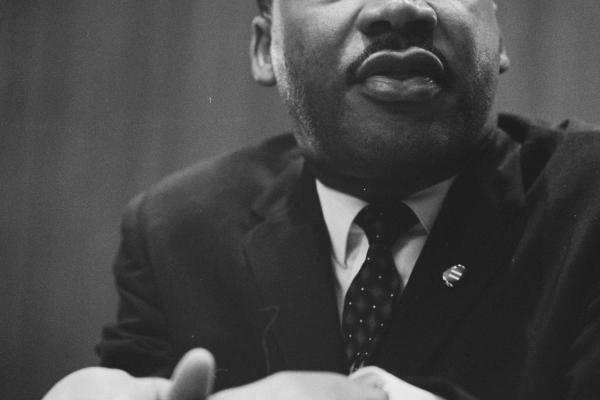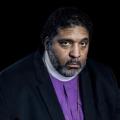Jewish scholar Abraham Joshua Heschel introduced Martin Luther King, Jr. to a rabbinical assembly in 1968, “a voice, a vision, and a way.”
“The whole future of America will depend on the impact and influence of Dr. King,” Heschel said.
Ten days later, King was gunned down in Memphis. America lost more than a civil rights leader. We lost a prophet.
But the prophetic voice did not die. As we pause to remember King, the prophetic voice rings out still, interrupting our petty politics of lies and fear to call forth a moral movement that recaptures our deepest religious and constitutional convictions.
No political candidate alone offers the hope we can believe in. We need the indictment, imagination, and inspiration of the prophetic voice in America.
Out of the ashes of Ferguson and Baltimore, the prophetic voice has arisen, demanding justice for Mike Brown, Freddie Gray, Eric Garner, Sandra Bland, and Tamir Rice.
It is a wake up call from all who face the nightmare of underfunded schools, lack of access to health care, racial profiling, mass incarceration, economic and political disenfranchisement.
This prophetic cry is the necessary alarm clock to rouse those Ta-Nehesi Coates has dubbed the “Dreamers,” — people who, imagining themselves to be white, blindly assume that America has steadily improved since King’s death.
The prophetic voice exposes both our nostalgic hopes of “making America great again” and our progressive dreams of “reform” as prescriptions based on a fundamental misdiagnosis. In a land of Dreamers, it is not enough to remember King’s dream.
We must also recall his prophetic critique.
“If America does not use her vast resources of wealth to end poverty,” King said, “she too will go to hell.”
My mother went into labor as King was delivering his “I Have a Dream” speech, and my earliest memory is of her weeping in front of a small black and white TV set five years later when King was assassinated.
I have lived my life as a black man in America under the echo of King’s prophetic voice. Like a north star, that prophetic voice has guided me to challenge the accepted division of conservative vs. liberal in our public life. Some things are not left or right. They’re just wrong. The prophet’s voice compels us to cry out in moral dissent.
While the prophet doesn’t begin with a political agenda, the cry of moral dissent does open space for a new vision of our common life. Twice in American history we have mustered the courage to uncover our racial wound and face its continued impact.
During Reconstruction, black and whites worked together in Southern legislatures to democratize the plantation economy, expanding education, voting rights, economic power, and civil rights. Poor white farmers recognized a common cause with freed slaves in fusion coalitions across the South.
Once again in the mid-20th century, coalitions of black and white, Christian and Jew, labor and civil rights joined together following the nonviolent struggles of the Montgomery Bus Boycott, the lunch counter sit-ins, and the Freedom Rides.
In a Second Reconstruction, we witnessed the legal victories of the Civil Rights Act and the Voting Rights Act, the Fair Housing Act, and the expansion of social security. But this Second Reconstruction was also violently resisted by the Ku Klux Klan and undermined by the FBI. King’s assassination was a direct attack on the prophetic vision of America’s Second Reconstruction.
While the coarse language of segregation went away, a Southern Strategy was developed to divide-and-conquer coalition politics in the South. For 40 long years we have wandered in the wilderness of a Solid South where so-called evangelicals “vote their values” by electing white men who talk about abortion, homosexuality, and prayer in schools while breaking every one of the Ten Commandments.
Down in North Carolina, the prophetic voice has awakened us from our slumber, stirring a vision for a Third Reconstruction. Beginning 10 years ago, we gathered an anti-racist, anti-poverty, pro-justice coalition to pursue a 14-point moral agenda. We defied the divide-and-conquer tactics of the Southern Strategy, and we won, breaking the Solid South when North Carolina cast all of its electoral votes for Obama in 2008.
But no victory goes unpunished in a prophetic moral struggle. The summer of 2013 brought an extreme makeover of state government in North Carolina. Only the prophet’s vision could guide us: we were caught up in the moral struggle of our time.
Over the course of 13 consecutive “Moral Mondays” in the summer of 2013, more than a 1,000 people were arrested in this nation’s largest ever state-government focused civil disobedience campaign. The following February, in the dead of winter, 100,000 people marched on North Carolina’s state capitol.
In his often forgotten instructions to the March on Washington, King moved from prophetic vision to a strategic plan. “Go back…” he said to those who had voiced a cry of moral dissent. Go back to Mississippi, to Alabama, to Georgia. Go South, to face the root of our nation’s original sin.
Heeding King’s voice, our Moral Movement has discovered the power of this prophetic way forward. We know we must be rooted in the South, American injustice’s native home. We must remain state-government focused, building on transformative coalitions that exemplify the diversity that is our future. And we must face race head-on, insisting on a grown-up conversation about race and poverty in our public squares.
Only a Third Reconstruction can save us from the violence we see in our street and in policies that commit attention violence against the poor.
As Heschel knew, the prophetic voice, vision, and way are not new. They are as old as the ancient prophets and as near to us as the very human Baptist preacher we remember today.
The future of America depends on the influence of a prophetic voice. The only question is whether we will embrace it by moving forward together or resist it by trying to shoot the messengers once again.
Got something to say about what you're reading? We value your feedback!

